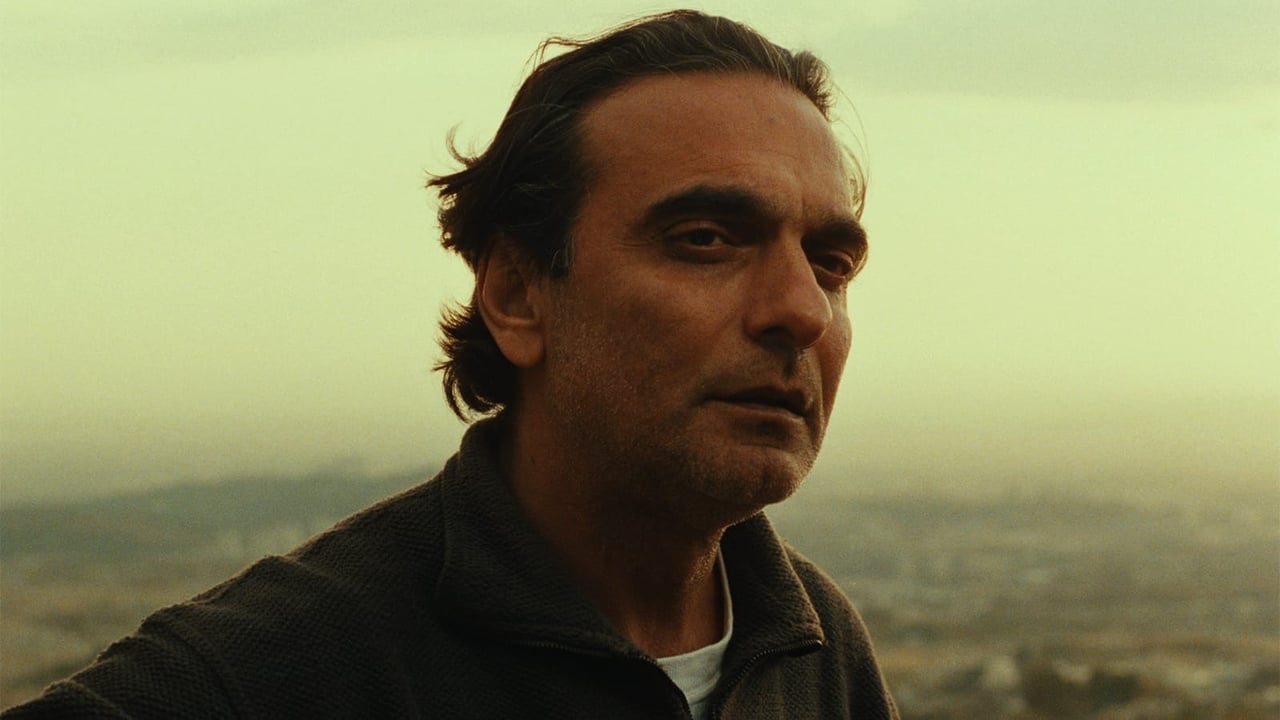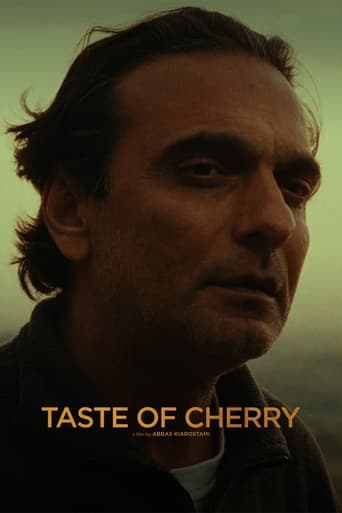



What a waste of my time!!!
Clever and entertaining enough to recommend even to members of the 1%
View MoreThe film's masterful storytelling did its job. The message was clear. No need to overdo.
View MoreThere's no way I can possibly love it entirely but I just think its ridiculously bad, but enjoyable at the same time.
View MoreA film about suicide but all I've seen was hope. Kiarostami is a true artist for creating such powerful and straight to the point dialouges, not only through few characters, but giving them access to improvise. This is a true masterpiece and a piece of art that I will never get over anytime soon. Recommended for everyone who believes that art is just conveying questions more than having messages.
View MoreAn unusual movie that encourage us to think. The film begins quite normally, through long scenes, where the director introduce the place where the film takes place and mystically represents us with the main character, as a man who asks another person to complete only one thing for him. (favor)As for the elements, they are almost repeated several times in the film, except for long general staff filled with speaking and after some time, some small action, except that we do not notice anything more significant in terms of the technical realization of the film. When I analyze this technique of recording, I can say that with that style of recording, that is, with these still and long frames, the inner state of the main character is emphasized, which we do not know very well, but we know that he wants to commit suicide. So with this element of calm and long frames, we notice that in fact the main character is with a solid character, good nerves and is resolute in fulfilling his purpose.Through the talks with his traveling companions, we learn a lot about him, his happiest time spent in the army, and the fact that there he met best friends for the rest of his life there.Through the last conversation he leads with his companion, Mr. Bagheri, in the film is added another element the taste of Cherries. This Sir. also tells him about the moment when he wanted to kill himself, but he was changed by the taste of mulberry, so he suggest to change his mind, and suggests cherries.
View MorePretentious was the word that came to my mind when I stepped out of the cinema after I saw the film, but the word did not sit quite right because I did not find the film pompous. Rather, the director made a sincere attempt to communicate his vision but fell short.I am a great fan of slow-paced, understated films, and love the work of Andrei Tarkovsky, Michelangelo Antonioni, Yasujiro Ozu, and some aspect of Theo Angelopoulos's work. So when my friend bowed out from the screening as she heard the film is boring, I wanted to give it a try. Unfortunately, not all boring films are the same.The choice that the director made to shoot the first part of the film (i.e. cross cutting the protagonist and the passenger in the confinement of the vehicle compartment and never place both in the same frame; rather closely cut medium shots of the vehicle steadily moving through the dirt road in a bleak and dusty landscape) might be an attempt to represent the inner state of the protagonist or the lack of connection between the characters, but it was too monotonous and repetitive. I believe many audiences are turned off by that and failed to see the slight change in the scenes after the protagonist drops off his last recruit (taxonomist) who attempted at length to persuade the protagonist not to commit suicide. Realistic but mundane and home-movie quality of the visual throughout the film doesn't help either. However, there is an attempt to represent the shift in the way the protagonist perceives his surroundings after he drops off the taxonomist. In particular the sunset shot in that segment was beautiful, but too short for my taste. Also it is too easy (or I dear say "too cheap") to choose sunset as the life's most beautiful moment.What I consider the best scene in this film is when the protagonist steps out of his car to observe heavy machinery moving earth on dusty hillside. One may find the metaphor too blatant, but the shadow of the protagonist against the falling earth and the protagonist being shot through the dusty haze while the worker urges him to move on were nicely executed.The ending of the film is controversial, and I belong to the naysayers' camp. It is not the quality of the visual but the choice. Some suggested that it might have been needed for political / religious / censorship reasons, but I didn't find it necessary for the pure story telling purpose. If the director feels compelled to provide relief to the audience, I prefer "The Machinist" (2004) or "A Beautiful Mind" (2001) ending, but such relief is not necessary unless the film is a high impact and moving film (sorry ) As for the visual, we can cut him some slack as I read somewhere that the real footage was lost and he needed to substitute with video footage he had.
View MoreAfter reading about Iranian culture and cinema I have to admit I was intrigued and pretty excited to see Taste of Cherry. However to be perfectly honest I found this film incredibly boring and tough to sit through, mainly because of the cinematic strategy used throughout. The film implements a lot of long static takes, most of which are in the same location, which elongates the time and space of this film to give it what I would describe as a real life pace. That combined with very little to no extreme time jumps makes it feel like we are simply watching a complete day of this man's life, which in terms of making this film feel real helps a lot, but making it entertaining, however, hinders it quite a bit. It seems obvious to me that the director, Abbas Kiarostami, wanted to draw importance to his messages by making the situation they're framed in as real feeling as possible, but when you sacrifice entertainment value to do so it's my belief that you're only preventing your message from getting across to the audience.The film has a pretty ambiguous ending; we as an audience are left to wonder whether or not Mr. Badii really killed himself followed by behind the scenes footage of Kiarostami and his crew making the movie. While it's my belief that he did kill himself, I can honestly say that at the end of the movie I couldn't have cared less either way. Kiarostami does little to nothing in terms of characterization to get us to sympathize with Mr. Badii, and the fact that we as an audience aren't made out to root for Mr. Badii as a character is what fuels my belief that he did indeed kill himself. It also keeps the audience from wanting to engage in any discussion over the material, which I'm sure is not what Kiarostami intended on. I assume the behind the scenes at the end was some sort of reminder from Kiarostami that we are indeed watching a movie (maybe as some sort of disclaimer?). However I agree with Roger Ebert in his review of the film when he said, and I'm paraphrasing, something along the lines of "we don't need to be reminded at the end that this is a movie because the slow and boring pace throughout is reminder enough." At the end of the day I understand what Kiarostami was going for and applaud him for trying to make his film feel as real as possible, but it's the lack of entertainment value that kept me from truly enjoying it, and after all we are in the entertainment industry.
View More